Eternal Universal Message of Bhagavad Gita Part 2
 NOTE: Part I of the article was published in Savetemples.org. It can be accessed by clicking on the link:
NOTE: Part I of the article was published in Savetemples.org. It can be accessed by clicking on the link:
Pearls of Wisdom to be learned
Dharma Reigns
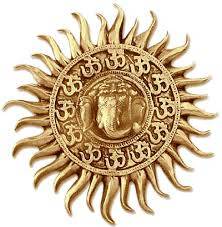 Bhagavad Gita starts with the word dharma which is defined as duty, responsibility, principle, and to hold together. When Sanjay started narrating the story, he used the word dharma to make Dhritarashtra reflect on his responsibility in this Kurukshetra where several religious activities have been conducted to preserve the customs and traditions. When Arjuna was despondent of the consequences of the war that may result in the death of many people, he seeks the advice of Lord Krishna who realized the Arjuna’s weakness of heart and feebleness. Dharma is the first word while Mama is the last word in the Bhagavad Gita. Combination of these two wards is Mama Dharma: - meaning my responsibility. It can also mean Atma Dharma or Swadharma. Lord tell Arjuna, it is his responsibility to fight by saying, “And even considering your personal dharma as well, it is not right for you to hesitate. There is nothing better for a warrior than a fight based on dharma.” (2.31). If you fail to execute your dharma for personal reasons, you shall incur sin. Those who perform their duty are very close to the Lord. “But those who fully honor this immortal nectar of dharma as it has been spoken [by Me], having faith, taking Me as supreme—those devotees are exceedingly dear to Me.” (12.20) In the first chapter it is clearly stated that there is a conflict of duties within all of us not knowing which course of action to take. Arjuna was in confusion and agony and not able to make a righteous decision. Lord Krishna talks about the eternal nature of soul, and says that one is not responsible for the consequences of discharging his dharma. “Even a very small amount of this dharma saves one from great danger, for there is no loss in such an endeavor, and it knows no diminution.” (Bg. 2.40). One must follow his dharma to preserve and protect the very nature of existence.
Bhagavad Gita starts with the word dharma which is defined as duty, responsibility, principle, and to hold together. When Sanjay started narrating the story, he used the word dharma to make Dhritarashtra reflect on his responsibility in this Kurukshetra where several religious activities have been conducted to preserve the customs and traditions. When Arjuna was despondent of the consequences of the war that may result in the death of many people, he seeks the advice of Lord Krishna who realized the Arjuna’s weakness of heart and feebleness. Dharma is the first word while Mama is the last word in the Bhagavad Gita. Combination of these two wards is Mama Dharma: - meaning my responsibility. It can also mean Atma Dharma or Swadharma. Lord tell Arjuna, it is his responsibility to fight by saying, “And even considering your personal dharma as well, it is not right for you to hesitate. There is nothing better for a warrior than a fight based on dharma.” (2.31). If you fail to execute your dharma for personal reasons, you shall incur sin. Those who perform their duty are very close to the Lord. “But those who fully honor this immortal nectar of dharma as it has been spoken [by Me], having faith, taking Me as supreme—those devotees are exceedingly dear to Me.” (12.20) In the first chapter it is clearly stated that there is a conflict of duties within all of us not knowing which course of action to take. Arjuna was in confusion and agony and not able to make a righteous decision. Lord Krishna talks about the eternal nature of soul, and says that one is not responsible for the consequences of discharging his dharma. “Even a very small amount of this dharma saves one from great danger, for there is no loss in such an endeavor, and it knows no diminution.” (Bg. 2.40). One must follow his dharma to preserve and protect the very nature of existence.
Importance of Sadguru
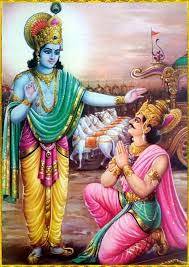 Sadguru Tattva permeates the entire cosmos as per Hindu scriptures. Guru is essential for spiritual growth and his advice, guidance and knowledge is sought by the disciples for many millennia. Guru is the one who can remove the ignorance by lighting the lamp of knowledge in the heart of the disciple. Sri Ganapathy Sachchidananda Swamiji says, “By mere touch the Guru transforms “Manava” (man) into “Madhava” (God). By his mere look “nara” (human) becomes “Narayana” (God) and “Jeeva (soul) realizes its identity with “Ishwara” (God). The land trodden by the Guru becomes a place of pilgrimage. By mere sight he transforms mud into delicious food and stone into glittering gold … There is nothing in this world that cannot be obtained by Guru’s grace.” Guru is indeed a friend in need, especially when our mind is fogged by ignorance, confused by turmoil, and disoriented with indecision. Guru is the only person who can come to the rescue. When Arjuna approached Lord Krishna by saying, “My heart is overpowered by the taint of pity, my mind is confused as to duty. I ask Thee: tell me decisively what is good for me. I am Thy disciple. Instruct me who has taken refuge in Thee.” (2:7). Knowing fully well about the nature of Guru who knows about both illusion and truth, and whose mission is to help his devotees to overcome the ignorance and darkness by imparting the knowledge and truth, Lord Krishna tells Arjuna the method to find a Guru and surrender. Sri Krishna Himself tells that, "Just try to learn the truth by approaching a spiritual master. Inquire from him submissively and render service unto him. The self-realized soul can impart knowledge unto you because he has seen the truth."(4:34). If we are very serious about understanding the science of God is a guru required. We should not try to keep a guru as a matter of fashion. One who has accepted a guru speaks intelligently. He never speaks nonsense. That is the sign of having accepted a bonafide guru. We should certainly offer all respect to the spiritual master, but we should also remember how to carry out his orders. Following the Lord Krishna’s message to Arjuna to carry his dharma in discharging his duties, Arjuna’s ignorance due to delusion, passion, attachments and perception of consequences was removed. He realized that it was his foolishness and childishness to think that he would be responsible for the death of his kith and kin, not knowing that everybody who is born is destined to die. Lord Krishna’s Vishwarupa convinced him of the inevitability. With that realization, Arjuna says, “My delusion is destroyed. I have regained my memory through Your grace, O Achyuta. I am firm. I am free from doubt. I shall act according to your word.” (18:73).
Sadguru Tattva permeates the entire cosmos as per Hindu scriptures. Guru is essential for spiritual growth and his advice, guidance and knowledge is sought by the disciples for many millennia. Guru is the one who can remove the ignorance by lighting the lamp of knowledge in the heart of the disciple. Sri Ganapathy Sachchidananda Swamiji says, “By mere touch the Guru transforms “Manava” (man) into “Madhava” (God). By his mere look “nara” (human) becomes “Narayana” (God) and “Jeeva (soul) realizes its identity with “Ishwara” (God). The land trodden by the Guru becomes a place of pilgrimage. By mere sight he transforms mud into delicious food and stone into glittering gold … There is nothing in this world that cannot be obtained by Guru’s grace.” Guru is indeed a friend in need, especially when our mind is fogged by ignorance, confused by turmoil, and disoriented with indecision. Guru is the only person who can come to the rescue. When Arjuna approached Lord Krishna by saying, “My heart is overpowered by the taint of pity, my mind is confused as to duty. I ask Thee: tell me decisively what is good for me. I am Thy disciple. Instruct me who has taken refuge in Thee.” (2:7). Knowing fully well about the nature of Guru who knows about both illusion and truth, and whose mission is to help his devotees to overcome the ignorance and darkness by imparting the knowledge and truth, Lord Krishna tells Arjuna the method to find a Guru and surrender. Sri Krishna Himself tells that, "Just try to learn the truth by approaching a spiritual master. Inquire from him submissively and render service unto him. The self-realized soul can impart knowledge unto you because he has seen the truth."(4:34). If we are very serious about understanding the science of God is a guru required. We should not try to keep a guru as a matter of fashion. One who has accepted a guru speaks intelligently. He never speaks nonsense. That is the sign of having accepted a bonafide guru. We should certainly offer all respect to the spiritual master, but we should also remember how to carry out his orders. Following the Lord Krishna’s message to Arjuna to carry his dharma in discharging his duties, Arjuna’s ignorance due to delusion, passion, attachments and perception of consequences was removed. He realized that it was his foolishness and childishness to think that he would be responsible for the death of his kith and kin, not knowing that everybody who is born is destined to die. Lord Krishna’s Vishwarupa convinced him of the inevitability. With that realization, Arjuna says, “My delusion is destroyed. I have regained my memory through Your grace, O Achyuta. I am firm. I am free from doubt. I shall act according to your word.” (18:73).
Guru Sishya sampradaya.
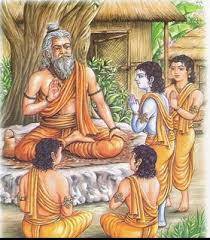 From ancient times on wards, Guru-sishya relationship existed in Bharat where mentoring of a student by a spiritual teacher is undertaken. Selfless transmission by a genuine, dedicated and committed teachers pass on the information to a student who is expected to receive the knowledge with committed, faith, devotion, respect and sincerity. The tradition of dialogue, discussion, debate, questioning, dissecting and deciphering is the hallmark of exchange of opinion. No WORD is taken for granted. Tradition of un-questioning the scriptures is unheard of this tradition. It is this kind of questioning that encouraged the freedom that is essential for the intellectual growth and survival of humanity. Just imagine how much valuable, eternal, immortal and everlasting message was rendered by Lord Krishna to Arjuna who asked a simple question about his confusion and dilemma about waging a war that might kill all his relatives and gurus? Unlike other religions, our scriptures document ample evidence of relentless discussion between a teacher and a student. Our scriptures encourage us to acquire knowledge through approaching a qualified Guru. A Guru should be tattva darshinah, one who should have realized the eternal essence of human existence by himself. Also, he should be a jnaninaha, one who knows the technique of can communicating the knowledge. It is only through complete surrender, service, respect and inquiry, one can gain get his doubts cleared. If do not approach this way, our ego will dominate our thinking and the capacity to learn dwindles. The words wisdom to be imparted have no impact on the learner. We should remember the words of Sant Jnaneshwar, who said that “I gained the realization by serving my guru YogirajaNivruttinatha.”
From ancient times on wards, Guru-sishya relationship existed in Bharat where mentoring of a student by a spiritual teacher is undertaken. Selfless transmission by a genuine, dedicated and committed teachers pass on the information to a student who is expected to receive the knowledge with committed, faith, devotion, respect and sincerity. The tradition of dialogue, discussion, debate, questioning, dissecting and deciphering is the hallmark of exchange of opinion. No WORD is taken for granted. Tradition of un-questioning the scriptures is unheard of this tradition. It is this kind of questioning that encouraged the freedom that is essential for the intellectual growth and survival of humanity. Just imagine how much valuable, eternal, immortal and everlasting message was rendered by Lord Krishna to Arjuna who asked a simple question about his confusion and dilemma about waging a war that might kill all his relatives and gurus? Unlike other religions, our scriptures document ample evidence of relentless discussion between a teacher and a student. Our scriptures encourage us to acquire knowledge through approaching a qualified Guru. A Guru should be tattva darshinah, one who should have realized the eternal essence of human existence by himself. Also, he should be a jnaninaha, one who knows the technique of can communicating the knowledge. It is only through complete surrender, service, respect and inquiry, one can gain get his doubts cleared. If do not approach this way, our ego will dominate our thinking and the capacity to learn dwindles. The words wisdom to be imparted have no impact on the learner. We should remember the words of Sant Jnaneshwar, who said that “I gained the realization by serving my guru YogirajaNivruttinatha.”
Remove the confusion and indecision.
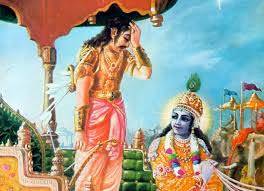 In Gita, Lord Krishna delivers the message to remove the confusion and sorrow that engulfed Arjuna, who asks the question: “With a heart contaminated by the taint of helplessness, with a mind confounded as to my duty, I ask you to tell me what is assuredly good for me. I am your disciple. Instruct me who have thrown myself on your indulgence." As soon as he entered the battle field and observed the formation of armies ready to fight, he was overpowered by emotional upheaval. Shocked at the prospects of meaningless slaughter of his kin and kith, Arjuna trembled and shivered. His weapon slipped from his arms, his legs failed him, his skin started burning, and his mouth parched. His discriminatory power was overpowered by grief, dejection, sorrow and depression. Knowing Arjuna is a warrior whose responsibility is to discharge his duty and fight instead of being fearful of the war, Lord Krishna condemned his desperation and denounced his attitude. Krishna’s message was that he should not be concerned about the death of his relatives, friends and gurus. There was no legitimate reason for him not to fight. He should not be indecisive and unclear about his role in life. He should rise to the challenge, lease aside his unmanliness and proceed to the battlefield as a Kshatriya. Lord Krishna says: “Undoubtedly, O Arjuna, the mind is restless and difficult to restrain, but it is subdued by any constant vigorous spiritual practice -- such as meditation -- with perseverance, and by detachment, O Arjuna. (6.35). Lord Krishna tells Arjuna to gain clarity on any given situation, ponder over it and develop clear, calm and collective mind to do his duty with no attachment. He should not grieve over people who should not be grieved. It is the ignorance that makes one to think that the destruction of visible body is the destruction of the embodied spirit which is indestructible.
In Gita, Lord Krishna delivers the message to remove the confusion and sorrow that engulfed Arjuna, who asks the question: “With a heart contaminated by the taint of helplessness, with a mind confounded as to my duty, I ask you to tell me what is assuredly good for me. I am your disciple. Instruct me who have thrown myself on your indulgence." As soon as he entered the battle field and observed the formation of armies ready to fight, he was overpowered by emotional upheaval. Shocked at the prospects of meaningless slaughter of his kin and kith, Arjuna trembled and shivered. His weapon slipped from his arms, his legs failed him, his skin started burning, and his mouth parched. His discriminatory power was overpowered by grief, dejection, sorrow and depression. Knowing Arjuna is a warrior whose responsibility is to discharge his duty and fight instead of being fearful of the war, Lord Krishna condemned his desperation and denounced his attitude. Krishna’s message was that he should not be concerned about the death of his relatives, friends and gurus. There was no legitimate reason for him not to fight. He should not be indecisive and unclear about his role in life. He should rise to the challenge, lease aside his unmanliness and proceed to the battlefield as a Kshatriya. Lord Krishna says: “Undoubtedly, O Arjuna, the mind is restless and difficult to restrain, but it is subdued by any constant vigorous spiritual practice -- such as meditation -- with perseverance, and by detachment, O Arjuna. (6.35). Lord Krishna tells Arjuna to gain clarity on any given situation, ponder over it and develop clear, calm and collective mind to do his duty with no attachment. He should not grieve over people who should not be grieved. It is the ignorance that makes one to think that the destruction of visible body is the destruction of the embodied spirit which is indestructible.
Balanced Mind/Equanimity
 Samatvaṁ yoga ucyate (Gita 2.48): Equilibrium, evenness, harmony, adjustment, adaptability, unity, the blending of the subject and the object in harmony is Yoga. In everything that we do, we must be able balance between various facets of life. Balance must be maintained in our daily life with regard to work, family, leisure, friends, opportunities, children and other pursuits. Decisions must be made based on the priorities as to what we consider as important on life based on dharmic values with no expectation of rewards or fruits. Let us remember the words of Lord Krishna: "Fixed in yoga, do thy work, O Winner of wealth (Arjuna), abandoning attachment, with an even mind in success and failure, for evenness of mind is called yoga"(2:48). It says when we face uncertain future, when we are challenged with failures, when the circumstances look gloomy, when we find no way out and when we are overwhelmed with hopelessness, it is difficult to overcome the hurdles in life. Here Lord Krishna says that we must develop the equipoise to face the devil. Mere acknowledgment of the vicissitudes of life and their immanent presence in our life help us to focus on performing our duty without regard for the fruits of action. Sorrow and happiness are inseparable. Success and failures are inevitable. Acceptance of this reality will help us to steer our life with equanimity, calmness and balance of mind. We should not allow these situations to faze us, intimidate us and surrender us.
Samatvaṁ yoga ucyate (Gita 2.48): Equilibrium, evenness, harmony, adjustment, adaptability, unity, the blending of the subject and the object in harmony is Yoga. In everything that we do, we must be able balance between various facets of life. Balance must be maintained in our daily life with regard to work, family, leisure, friends, opportunities, children and other pursuits. Decisions must be made based on the priorities as to what we consider as important on life based on dharmic values with no expectation of rewards or fruits. Let us remember the words of Lord Krishna: "Fixed in yoga, do thy work, O Winner of wealth (Arjuna), abandoning attachment, with an even mind in success and failure, for evenness of mind is called yoga"(2:48). It says when we face uncertain future, when we are challenged with failures, when the circumstances look gloomy, when we find no way out and when we are overwhelmed with hopelessness, it is difficult to overcome the hurdles in life. Here Lord Krishna says that we must develop the equipoise to face the devil. Mere acknowledgment of the vicissitudes of life and their immanent presence in our life help us to focus on performing our duty without regard for the fruits of action. Sorrow and happiness are inseparable. Success and failures are inevitable. Acceptance of this reality will help us to steer our life with equanimity, calmness and balance of mind. We should not allow these situations to faze us, intimidate us and surrender us.
Stithipragna
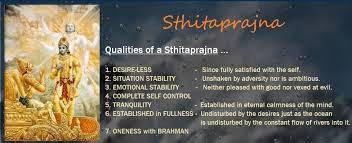 In life many decisions are made with vagaries of mind. Mind is always changing, not stable. Decisions made without having agitated mind yields better results. Lord Krishna says that one should be able to make decision effortlessly, naturally and calmly based on the pros and cons of the situation with no attachments. One must do sadhana to reach that state known as Stithipragna. Pragna means wisdom and intellect; Stithi means steady, stable, fixed. It is the stage where one will be able to have effective control over his Mind and the Indiriyas (sense organs). Vagaries of life would not shake the steadiness. Just like a driver of Charioteer can control the horses, mind should be able to control all the sense organs. To achieve this stage, one must be trained by a living guru and practice controlling mind under his guidance. Stithipragna is always alert, wakeful, efficient, attentive and careful. In this stage whatever we do, it is done with the full control of mind and control of all Indiriyas based on wisdom, not based on whims and fancies. Decisions must be made with no attachment, no fear and no anger. Steady mind is a prerequisite for making rational decision. The Lord said: When one relinquishes all the desires arising in the mind, O Arjuna, when one is satisfied in oneself with the Self, then one is said to be of steady wisdom (sthita-prajña). (2:55) One whose mind is not perturbed by pain, who does not hanker after pleasures, who is free from desire, fear and anger — is called a sage of steady intellect (sthita-dhi). (2:56) He who has no attachment anywhere, who, when encountering the agreeable or the disagreeable feels neither attraction nor aversion — his wisdom is firmly established (prajñā-pratiṣṭhitā). (2:57) When one is able to withdraw the senses from the objects of senses on every side, as a tortoise withdraws its limbs, then one's wisdom is firmly established. (2:57)
In life many decisions are made with vagaries of mind. Mind is always changing, not stable. Decisions made without having agitated mind yields better results. Lord Krishna says that one should be able to make decision effortlessly, naturally and calmly based on the pros and cons of the situation with no attachments. One must do sadhana to reach that state known as Stithipragna. Pragna means wisdom and intellect; Stithi means steady, stable, fixed. It is the stage where one will be able to have effective control over his Mind and the Indiriyas (sense organs). Vagaries of life would not shake the steadiness. Just like a driver of Charioteer can control the horses, mind should be able to control all the sense organs. To achieve this stage, one must be trained by a living guru and practice controlling mind under his guidance. Stithipragna is always alert, wakeful, efficient, attentive and careful. In this stage whatever we do, it is done with the full control of mind and control of all Indiriyas based on wisdom, not based on whims and fancies. Decisions must be made with no attachment, no fear and no anger. Steady mind is a prerequisite for making rational decision. The Lord said: When one relinquishes all the desires arising in the mind, O Arjuna, when one is satisfied in oneself with the Self, then one is said to be of steady wisdom (sthita-prajña). (2:55) One whose mind is not perturbed by pain, who does not hanker after pleasures, who is free from desire, fear and anger — is called a sage of steady intellect (sthita-dhi). (2:56) He who has no attachment anywhere, who, when encountering the agreeable or the disagreeable feels neither attraction nor aversion — his wisdom is firmly established (prajñā-pratiṣṭhitā). (2:57) When one is able to withdraw the senses from the objects of senses on every side, as a tortoise withdraws its limbs, then one's wisdom is firmly established. (2:57)
Gita’s Message is Cosmic / Universal
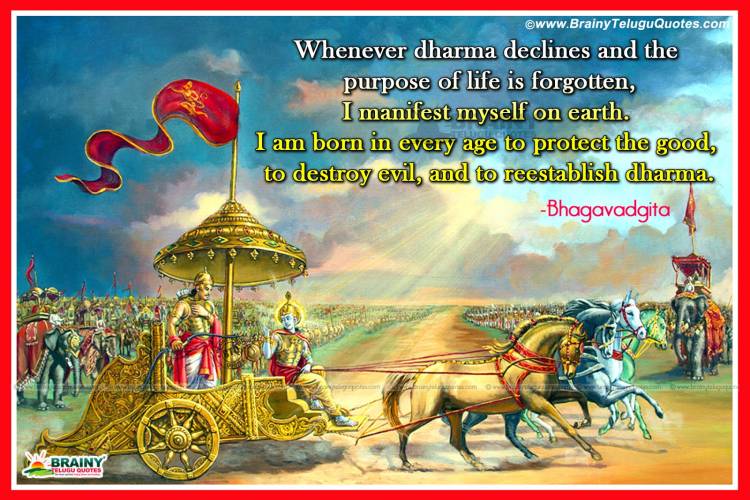 The Bhagavad Gita’s message universal and eternal. It is a book for all ages. It addresses to every human individual, irrespective of religion, to help him to solve the difficult vexing and puzzling issues one faces in his daily living wither at work or home. It transcends race, religion, boundaries, time and space. Swami Sivananda says that Bhagavad Gita is a “divine wisdom addressed to mankind for all times, in order to help human beings face and solve the ever-present problems of birth and death, of pain, suffering, fear, bondage, love and hate. It enables man to liberate himself from all limiting factors and reach a state of perfect balance, inner stability and mental peace, complete freedom from grief, fear and anxiety… This is the experience of everyone in this world, the drama of the ascent of man from a state of utter dejection, sorrow and total breakdown and hopelessness to a state of perfect understanding, clarity, renewed strength and triumph.” Swami Sivananda Aliya Khan, a Muslim Girl, who donned the dress of Lord Krishna while chanting Bhagavad Gita stood second in the competition. She received the prize of Rupees 25,000 from Yogi Adityanath, the Chief Minister of Uttara Pradesh on December 3, 2017. When asked why she read Bhagavad Gits being a Muslim, she said, “I read Gita for knowledge and this can be obtained from scriptures of any religion. The scriptures tell us about humanity and human values. I have done that by reading and reciting from Bhagwad Gita. It is not a religious book, it teaches you about the philosophy of life and Karma.” Paramahamsa Yoganand says that the message is universal, timeless and eternal. It is applied to all levels of intellectuals, and all levels human endeavors. This is the message of constant inner battles to be won by both spiritual and materialistic persons. “The timeless message of the Bhagavad Gita does not refer only to one historical battle, but to the cosmic conflict between good and evil: life as a series of battles between Spirit and matter, soul and body, life and death, knowledge and ignorance, health and disease, changelessness and transitoriness, self-control and temptations, discrimination and the blind sense-mind....”
The Bhagavad Gita’s message universal and eternal. It is a book for all ages. It addresses to every human individual, irrespective of religion, to help him to solve the difficult vexing and puzzling issues one faces in his daily living wither at work or home. It transcends race, religion, boundaries, time and space. Swami Sivananda says that Bhagavad Gita is a “divine wisdom addressed to mankind for all times, in order to help human beings face and solve the ever-present problems of birth and death, of pain, suffering, fear, bondage, love and hate. It enables man to liberate himself from all limiting factors and reach a state of perfect balance, inner stability and mental peace, complete freedom from grief, fear and anxiety… This is the experience of everyone in this world, the drama of the ascent of man from a state of utter dejection, sorrow and total breakdown and hopelessness to a state of perfect understanding, clarity, renewed strength and triumph.” Swami Sivananda Aliya Khan, a Muslim Girl, who donned the dress of Lord Krishna while chanting Bhagavad Gita stood second in the competition. She received the prize of Rupees 25,000 from Yogi Adityanath, the Chief Minister of Uttara Pradesh on December 3, 2017. When asked why she read Bhagavad Gits being a Muslim, she said, “I read Gita for knowledge and this can be obtained from scriptures of any religion. The scriptures tell us about humanity and human values. I have done that by reading and reciting from Bhagwad Gita. It is not a religious book, it teaches you about the philosophy of life and Karma.” Paramahamsa Yoganand says that the message is universal, timeless and eternal. It is applied to all levels of intellectuals, and all levels human endeavors. This is the message of constant inner battles to be won by both spiritual and materialistic persons. “The timeless message of the Bhagavad Gita does not refer only to one historical battle, but to the cosmic conflict between good and evil: life as a series of battles between Spirit and matter, soul and body, life and death, knowledge and ignorance, health and disease, changelessness and transitoriness, self-control and temptations, discrimination and the blind sense-mind....”
Niskama Karma
 Bhagavad Gita is the source of for one’s ethics with regard to the discharge of his duty without expectation to the fruits of action. Performing duty without motivation, thinking, deliberating and calculating about its outcomes tends to purify one's mind and see the value of desire less action. Karma without kama (desire) is nishkama karma. One should not give up doing his action. It should be done with no expectation of rewards, fruits, benefits or incentives. These concepts are vividly described in the following verses: To action alone hast thou a right and never at all to its fruits; let not the fruits of action be thy motive; neither let there be in thee any attachment to inaction. (2:47). The Gita advocates action, relentless action regardless of the rewards. It preaches the mantra of karma yoga and defines it as dexterity in action; ‘yagahe karmasu kaushalam’ (Yoga is excellent at work) gives new dignity to work.
Bhagavad Gita is the source of for one’s ethics with regard to the discharge of his duty without expectation to the fruits of action. Performing duty without motivation, thinking, deliberating and calculating about its outcomes tends to purify one's mind and see the value of desire less action. Karma without kama (desire) is nishkama karma. One should not give up doing his action. It should be done with no expectation of rewards, fruits, benefits or incentives. These concepts are vividly described in the following verses: To action alone hast thou a right and never at all to its fruits; let not the fruits of action be thy motive; neither let there be in thee any attachment to inaction. (2:47). The Gita advocates action, relentless action regardless of the rewards. It preaches the mantra of karma yoga and defines it as dexterity in action; ‘yagahe karmasu kaushalam’ (Yoga is excellent at work) gives new dignity to work.
Karma and Reincarnation
 Bhagavad Gita clearly enumerates connection between karma and reincarnation. Soul reincarnates again and again depending on the actions performed when it entered the body. Individual soul is separated from the Source. This soul takes innumerable incarnations until it perfected itself and finally reunited with the Supersoul. The ultimate goal of every soul is to be released from karmic cycle. Only then the soul stops to incarnate and achieves final liberation from the cycle of samsara. Number of births a soul reincarnates depend on the kind of actions one performs in his life cycles. One can move up or down in the hierarchy of life depending on his karmas. If one performs good deeds he will be born in a more comfortable situation. If one engages in bad deeds, he will be born to bear a difficult condition. One reaps what they sow. Bhagavad Gita vividly describes the journey of soul as follows: "As the embodied soul continuously passes, in this body, from boyhood to youth to old age, the soul similarly passes into another body at death."(2.13) "As a person puts on new garments, giving up old ones, the soul similarly accepts new material bodies, giving up the old and useless ones."(2.22). "The soul can never be cut to pieces by any weapon, nor burned by fire, nor moistened by water, nor withered by the wind. (2.23) At the time of death, the soul leaves the body and reenters another gross body depending on the accumulation of karma. The actions performed in the present life before death will determine the next life. The soul is permanent, and the body is impermanent.
Bhagavad Gita clearly enumerates connection between karma and reincarnation. Soul reincarnates again and again depending on the actions performed when it entered the body. Individual soul is separated from the Source. This soul takes innumerable incarnations until it perfected itself and finally reunited with the Supersoul. The ultimate goal of every soul is to be released from karmic cycle. Only then the soul stops to incarnate and achieves final liberation from the cycle of samsara. Number of births a soul reincarnates depend on the kind of actions one performs in his life cycles. One can move up or down in the hierarchy of life depending on his karmas. If one performs good deeds he will be born in a more comfortable situation. If one engages in bad deeds, he will be born to bear a difficult condition. One reaps what they sow. Bhagavad Gita vividly describes the journey of soul as follows: "As the embodied soul continuously passes, in this body, from boyhood to youth to old age, the soul similarly passes into another body at death."(2.13) "As a person puts on new garments, giving up old ones, the soul similarly accepts new material bodies, giving up the old and useless ones."(2.22). "The soul can never be cut to pieces by any weapon, nor burned by fire, nor moistened by water, nor withered by the wind. (2.23) At the time of death, the soul leaves the body and reenters another gross body depending on the accumulation of karma. The actions performed in the present life before death will determine the next life. The soul is permanent, and the body is impermanent.
Bhakti Yoga
 Lord Krishna teaches the importance of pure and pointed devotion to cross the cycle of birth and the troubles and tribulations one must go through are arduous and difficult to bear. But for devotee who firmly believes in God, merges his consciousness with Him, constantly thinks about Him, and performs all his actions dedicated to him, will be lead to God-realization. Krishna says that it is not easy to develop pure love because of restless and wandering mind. It is a slow process and through constant efforts and total dedication one can develop full faith. What is the process of developing that kind bhakti toward the Lord. How does one become a bhakta of Lord Krishna? It is narrated in the verse as follows: “Always chanting my glories, endeavoring with great determination, bowing down before Me, these great souls perpetually worship Me with devotion.” (Bhagavad-Gita 9.14) When Krishna talks about the path of devotion, he is no longer speaking in the third person. I am the same to all beings, and my love is ever the same; but those who worship me with devotion, they are in me and I am in them. For if even one who does evil were to worship me with all his soul, he must be considered righteous, because of his righteous will. He will soon become pure and reach everlasting peace. For be aware, Arjuna, that he who loves me shall not perish. (9:29–31) A more structured and condensed description of a descending ‘ladder of devotion’ appears in Chapter 12:
Lord Krishna teaches the importance of pure and pointed devotion to cross the cycle of birth and the troubles and tribulations one must go through are arduous and difficult to bear. But for devotee who firmly believes in God, merges his consciousness with Him, constantly thinks about Him, and performs all his actions dedicated to him, will be lead to God-realization. Krishna says that it is not easy to develop pure love because of restless and wandering mind. It is a slow process and through constant efforts and total dedication one can develop full faith. What is the process of developing that kind bhakti toward the Lord. How does one become a bhakta of Lord Krishna? It is narrated in the verse as follows: “Always chanting my glories, endeavoring with great determination, bowing down before Me, these great souls perpetually worship Me with devotion.” (Bhagavad-Gita 9.14) When Krishna talks about the path of devotion, he is no longer speaking in the third person. I am the same to all beings, and my love is ever the same; but those who worship me with devotion, they are in me and I am in them. For if even one who does evil were to worship me with all his soul, he must be considered righteous, because of his righteous will. He will soon become pure and reach everlasting peace. For be aware, Arjuna, that he who loves me shall not perish. (9:29–31) A more structured and condensed description of a descending ‘ladder of devotion’ appears in Chapter 12:
Respect for Freedom
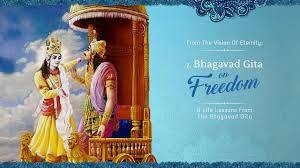 Arjuna was distraught about the potential demise of his kith and kin, his Gurus and the dynasty itself and expressed his desire not to fight. Lord Krishna realizing the despondence of Arjuna, He delivers the eternal message of individual dharma to uphold the harmony in the society. Lord Krishan talks about the Supersoul, dharma of each person, the inherent nature of creation, the karma theory, importance of devotion and knowledge, and how to remain balanced in the society faced with turmoil and turbulence. He even showed his Viswaroopa to convince the inevitable nature of the existence itself. Arjuna is Kshatriya and his natural duty is to fight for justice. Through Viveka (discrimination). One should surrender to the Lord. Whoever engages himself under the direction of the Supreme Lord, he becomes glorious. One should not think of himself as independent of the Lord since he abides in very living creature. Lord Krishna tell Arjuna in 18:62 sloka that he should surrender to Him completely. By doing so, one will attain transcendental peace and eternal abode. Finally, Lord says, “Thus I have explained to you, knowledge still more confidential. Deliberate on this fully, and then do what you wish to do.” (18:63) The hall mark of Bhagavad Gita and Hinduism is the concept of freedom. It is only with unflinching freedom, one can excel in his talents and skills and contribute to the welfare and prosperity of the society. Any imposition by or interference from external authority would not be conducive to healthy society. That is the reason, Lord tells Arjuna that he should deliberate on His message with all his intelligence and decide by himself. No external pressure was imposed on Arjuna and Lord Krishna did not ask him to do what he wanted to him to do. Lord gave him full freedom to choose his course of action.
Arjuna was distraught about the potential demise of his kith and kin, his Gurus and the dynasty itself and expressed his desire not to fight. Lord Krishna realizing the despondence of Arjuna, He delivers the eternal message of individual dharma to uphold the harmony in the society. Lord Krishan talks about the Supersoul, dharma of each person, the inherent nature of creation, the karma theory, importance of devotion and knowledge, and how to remain balanced in the society faced with turmoil and turbulence. He even showed his Viswaroopa to convince the inevitable nature of the existence itself. Arjuna is Kshatriya and his natural duty is to fight for justice. Through Viveka (discrimination). One should surrender to the Lord. Whoever engages himself under the direction of the Supreme Lord, he becomes glorious. One should not think of himself as independent of the Lord since he abides in very living creature. Lord Krishna tell Arjuna in 18:62 sloka that he should surrender to Him completely. By doing so, one will attain transcendental peace and eternal abode. Finally, Lord says, “Thus I have explained to you, knowledge still more confidential. Deliberate on this fully, and then do what you wish to do.” (18:63) The hall mark of Bhagavad Gita and Hinduism is the concept of freedom. It is only with unflinching freedom, one can excel in his talents and skills and contribute to the welfare and prosperity of the society. Any imposition by or interference from external authority would not be conducive to healthy society. That is the reason, Lord tells Arjuna that he should deliberate on His message with all his intelligence and decide by himself. No external pressure was imposed on Arjuna and Lord Krishna did not ask him to do what he wanted to him to do. Lord gave him full freedom to choose his course of action.
Bhagavad Gita and Businessmen.
 Bhagavad Gita has become one of the top books that has impacted the top executives in India and Abroad. In 2006, BusinessWeek published an article with title “How Bhagavad Gita has charmed US corporates” describing how many top executives of different corporations attended the seminars to learn about the Indian philosophy to balance the business ideas of amassing wealth with the desire to live with inner happiness. It says, “Big business is embracing Indian philosophy. Suddenly, phrases from ancient Hindu Texts such as Bhagavad Gita are popping up in management tomes and on websites of consultants.” Almost all the major Business schools in USA have at least ten percent faculty members been of Indian descent. In fact, Dean of Kellogg School says, “When senior executives come to Kellogg, Wharton, Harvard or Dartmouth’s Tuck, they are exposed to Indian values that are reflected in the way we think and articulate.” They are learning to expand their horizon with Indian values, embrace more holistic approach in life and getting motivated a broader outlook than just money. Many Business Schools have taken the opportunity to turn to Indian philosophical outlook for shaping the future of the upcoming business managers. Bob Miglani of Pfizer says, “I think American executives are also getting exposed to spiritual values which are most often delivered by Indian management professors, in top American business schools. Indian professors such as Srikumar Rao are ideally placed to be the executive coaches of the next generation of Fortune 500 firms because they manage to balance their teachings with an East-West flavor. These academics are very smart and their message comes across so easily…in a warm and fuzzy sort of way.” Asian Indian academicians are introducing the principles of Bhagavad Gita to the Corporate world. They have coached people on Wall Street and executives at Johnson & Johnson, McDonald's, United Airlines, Google and Microsoft. Professor Srikumar Rao, author of Happiness at Work, says, “The West is indoctrinated heavily into achieving goals: good grades will get you into a good college which in turn will get you a good job. If you succeed your life is good, otherwise you are doomed. So, everyone is goal-centric and gets set up to face inevitable disappointments,”His course is highly rated for helping people balance the compulsion to amass wealth with the desire for happiness. In 2013, Debashi Chatterjee felt that Bhagavad Gita would bring back the honesty and integrity so lacking in the modern society. “Bhagavad Gita’ time has come. It is not a religious manual in as much as a manual of practice… It tells you how to regain your equanimity in a war-like situation.” The importance of learning the intrinsic nature of the human mind to focus with determination, Gita’s perennial philosophy is needed for every dimension of human life including business management. Senior Analyst of Deutsche Bank says, “The Gita is even taught in a course called Leadership, Inspiration, Dilemma and Action and is very relevant to modern managerial dilemmas.” Bhagavad Gita also became a management mantra that found its way into the curriculum of Indian Institute of Management (IIM) in Indore. Ten different sessions on Bhagavad Gita took the students through the discourses on Raja Yoga and Karma Yoga. The students were imparted many lessons on “how to develop and channelize their spiritual and mental energies to achieve excellence in the field of business management.” The aim of this program was to make students not only good managers, but also responsible corporate citizen.
Bhagavad Gita has become one of the top books that has impacted the top executives in India and Abroad. In 2006, BusinessWeek published an article with title “How Bhagavad Gita has charmed US corporates” describing how many top executives of different corporations attended the seminars to learn about the Indian philosophy to balance the business ideas of amassing wealth with the desire to live with inner happiness. It says, “Big business is embracing Indian philosophy. Suddenly, phrases from ancient Hindu Texts such as Bhagavad Gita are popping up in management tomes and on websites of consultants.” Almost all the major Business schools in USA have at least ten percent faculty members been of Indian descent. In fact, Dean of Kellogg School says, “When senior executives come to Kellogg, Wharton, Harvard or Dartmouth’s Tuck, they are exposed to Indian values that are reflected in the way we think and articulate.” They are learning to expand their horizon with Indian values, embrace more holistic approach in life and getting motivated a broader outlook than just money. Many Business Schools have taken the opportunity to turn to Indian philosophical outlook for shaping the future of the upcoming business managers. Bob Miglani of Pfizer says, “I think American executives are also getting exposed to spiritual values which are most often delivered by Indian management professors, in top American business schools. Indian professors such as Srikumar Rao are ideally placed to be the executive coaches of the next generation of Fortune 500 firms because they manage to balance their teachings with an East-West flavor. These academics are very smart and their message comes across so easily…in a warm and fuzzy sort of way.” Asian Indian academicians are introducing the principles of Bhagavad Gita to the Corporate world. They have coached people on Wall Street and executives at Johnson & Johnson, McDonald's, United Airlines, Google and Microsoft. Professor Srikumar Rao, author of Happiness at Work, says, “The West is indoctrinated heavily into achieving goals: good grades will get you into a good college which in turn will get you a good job. If you succeed your life is good, otherwise you are doomed. So, everyone is goal-centric and gets set up to face inevitable disappointments,”His course is highly rated for helping people balance the compulsion to amass wealth with the desire for happiness. In 2013, Debashi Chatterjee felt that Bhagavad Gita would bring back the honesty and integrity so lacking in the modern society. “Bhagavad Gita’ time has come. It is not a religious manual in as much as a manual of practice… It tells you how to regain your equanimity in a war-like situation.” The importance of learning the intrinsic nature of the human mind to focus with determination, Gita’s perennial philosophy is needed for every dimension of human life including business management. Senior Analyst of Deutsche Bank says, “The Gita is even taught in a course called Leadership, Inspiration, Dilemma and Action and is very relevant to modern managerial dilemmas.” Bhagavad Gita also became a management mantra that found its way into the curriculum of Indian Institute of Management (IIM) in Indore. Ten different sessions on Bhagavad Gita took the students through the discourses on Raja Yoga and Karma Yoga. The students were imparted many lessons on “how to develop and channelize their spiritual and mental energies to achieve excellence in the field of business management.” The aim of this program was to make students not only good managers, but also responsible corporate citizen.
Develop Management Skills.
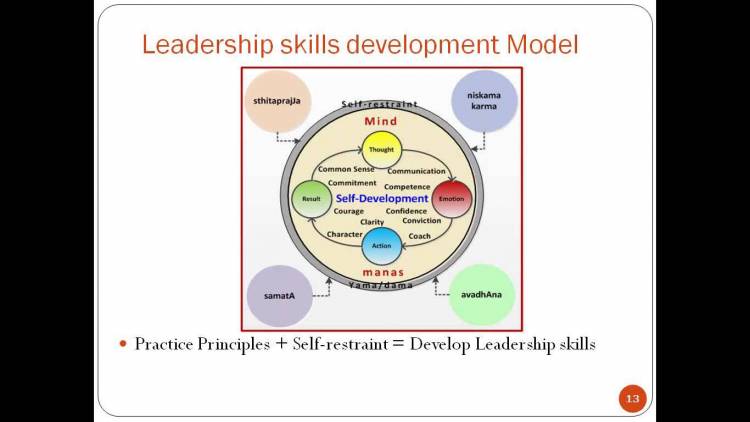 Business management is riddles with stress, strain, pressure and tensions. The managers must meet the deadline and complete the task within a short period of time. The dejection and depression Arjun are typical of many managers. His frustration was typical of these managers. Arjuna says, "Mind is very restless, forceful and strong, O Krishna, it is more difficult to control the mind than to control the wind." Lord Krishna says that one must do his duty without attachment. Because, it is the ego that interferes with the task. In any business, the work involves vigorous and arduous effort to pursue the task on hand. Mind always gets agitated as we get stressed up whenever we are involved in time bound work culture. Bhagavad Gita provides a set of guidelines, that may help achieve the goal completing the assigned task, such as perseverance, commitment, balance, clarity, motivation, self-discipline, integrity, fearlessness, steady mind and self-confidence. Lord Krishna says that a doer has the right to work, he does not have control over the result, he cannot afford to be inactive and success depends on selfless action only. The last chapter of Bhagavad Gita talks about the important lesson of renunciation to be an effective leader in any organization. Renunciation is a process whereby a leader must be a symbol of selfless giving and strive for the common good of the company and the society. Also abstain from selfish acts and detach from the fruits. This is very difficult to practice in today’s condition where deceit, dishonesty, selfishness, greed, and profit making dominates the world of work. As per the theory of renunciation, if the result of our efforts is successful, the entire credit should be appropriated to all the doers. Similarly, if the efforts result in failure, every doer should take the responsibility. Business is a collective effort. It should look at the long-range plans to succeed with honesty and selflessness. Philosophical outlook is important to succeed in the long run. Greed will result in a failure. Leaders should be philanthropic and self-sacrificing for the survival of a company.
Business management is riddles with stress, strain, pressure and tensions. The managers must meet the deadline and complete the task within a short period of time. The dejection and depression Arjun are typical of many managers. His frustration was typical of these managers. Arjuna says, "Mind is very restless, forceful and strong, O Krishna, it is more difficult to control the mind than to control the wind." Lord Krishna says that one must do his duty without attachment. Because, it is the ego that interferes with the task. In any business, the work involves vigorous and arduous effort to pursue the task on hand. Mind always gets agitated as we get stressed up whenever we are involved in time bound work culture. Bhagavad Gita provides a set of guidelines, that may help achieve the goal completing the assigned task, such as perseverance, commitment, balance, clarity, motivation, self-discipline, integrity, fearlessness, steady mind and self-confidence. Lord Krishna says that a doer has the right to work, he does not have control over the result, he cannot afford to be inactive and success depends on selfless action only. The last chapter of Bhagavad Gita talks about the important lesson of renunciation to be an effective leader in any organization. Renunciation is a process whereby a leader must be a symbol of selfless giving and strive for the common good of the company and the society. Also abstain from selfish acts and detach from the fruits. This is very difficult to practice in today’s condition where deceit, dishonesty, selfishness, greed, and profit making dominates the world of work. As per the theory of renunciation, if the result of our efforts is successful, the entire credit should be appropriated to all the doers. Similarly, if the efforts result in failure, every doer should take the responsibility. Business is a collective effort. It should look at the long-range plans to succeed with honesty and selflessness. Philosophical outlook is important to succeed in the long run. Greed will result in a failure. Leaders should be philanthropic and self-sacrificing for the survival of a company.
The Curative Powers
 In Bhagavad Gita, Lord Krishna’s message not only gives courage, fearlessness and strength to discharge one’s responsibility with equanimity by balancing the mind, body, and soul but it also has many curative powers that benefit the reader. T. R. Seshadri in his book “The Curative Powers OF the Holy Gita” gives many verses that can be used to cure certain types of deceases. In fact, he says that if we look at the condition Arjuna described after he decided not to fight with gurus and kinsmen is very similar to person who was about to have a heart attack. Arjuna says that his mouth was perched, unable to stand and hold his weapon, body was shivering, hair stood up, skin burns up all over, mind was reeling, and limbs failing. Lord Krishna’s message was a cure for his heart attack like condition. Similarly, a person with blood pressure (hypertension, hypotension), depression, impotency, neurosis, sexual disorders, stress, syphilis and venereal infections is said to benefit from chanting this verse: “The one who is not depressed in adversity or disturbed by pleasure and pain, and is devoid of attachment, fear and anger – he is indeed a steadfast one.” (Gita 2:56). A person with AIDS, alcohol and drug addiction, blood pressure, brain disorders, depression, mental disorders, mind control, neurosis, psychic and psychosomatic illness, sexual disorders, stress, stroke and tension can be benefitted by chanting this verse: “The turbulent senses forcibly lead astray the minds of even the wise. To control them, one should sit meditation on Me. He who has his senses under control, is steadfast in his wisdom.” (Gita 2: 61) For child birth, conception, delivery, gynecological disorders, menstrual problems and pregnancy, v: “God is the goal, the sustainer, the witness, the abode, the refuge, the friend, the source, the destroyer, the supporter, the resting place and the imperishable seed.” (9:18) The author suggests that these verses should be chanted only in SANSKRIT to have an impact on the mind which is the source of stress and numerous deceases. It is argued that the correct understanding of verses in the Bhagavad Gita can alleviate stress and strain, which is the root cause of several modern-day diseases
In Bhagavad Gita, Lord Krishna’s message not only gives courage, fearlessness and strength to discharge one’s responsibility with equanimity by balancing the mind, body, and soul but it also has many curative powers that benefit the reader. T. R. Seshadri in his book “The Curative Powers OF the Holy Gita” gives many verses that can be used to cure certain types of deceases. In fact, he says that if we look at the condition Arjuna described after he decided not to fight with gurus and kinsmen is very similar to person who was about to have a heart attack. Arjuna says that his mouth was perched, unable to stand and hold his weapon, body was shivering, hair stood up, skin burns up all over, mind was reeling, and limbs failing. Lord Krishna’s message was a cure for his heart attack like condition. Similarly, a person with blood pressure (hypertension, hypotension), depression, impotency, neurosis, sexual disorders, stress, syphilis and venereal infections is said to benefit from chanting this verse: “The one who is not depressed in adversity or disturbed by pleasure and pain, and is devoid of attachment, fear and anger – he is indeed a steadfast one.” (Gita 2:56). A person with AIDS, alcohol and drug addiction, blood pressure, brain disorders, depression, mental disorders, mind control, neurosis, psychic and psychosomatic illness, sexual disorders, stress, stroke and tension can be benefitted by chanting this verse: “The turbulent senses forcibly lead astray the minds of even the wise. To control them, one should sit meditation on Me. He who has his senses under control, is steadfast in his wisdom.” (Gita 2: 61) For child birth, conception, delivery, gynecological disorders, menstrual problems and pregnancy, v: “God is the goal, the sustainer, the witness, the abode, the refuge, the friend, the source, the destroyer, the supporter, the resting place and the imperishable seed.” (9:18) The author suggests that these verses should be chanted only in SANSKRIT to have an impact on the mind which is the source of stress and numerous deceases. It is argued that the correct understanding of verses in the Bhagavad Gita can alleviate stress and strain, which is the root cause of several modern-day diseases
Treasures still to be tapped
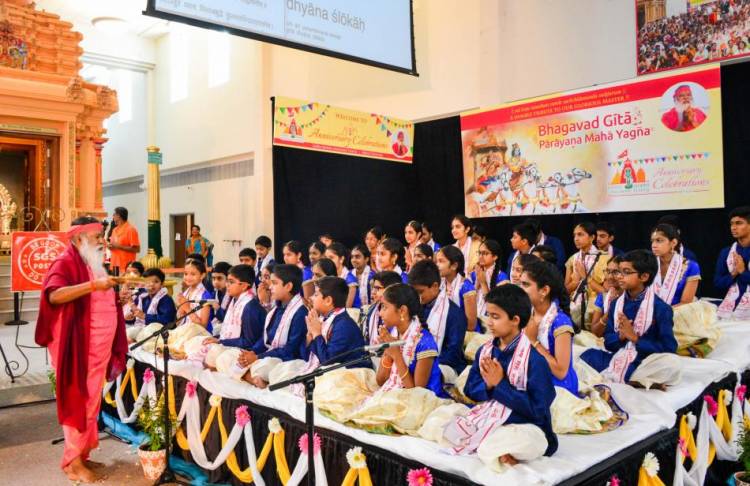 In USA, the study of the Bhagvad Gita has become mandatory for every student joining Seton Hall University in New Jersey from 2008.The university wanted to introduce a transformational course that will influence the character and life of its students. Also, it wanted a course that seek answers to perennial questions like the purpose of life, why are we here, where are we going, etc,. as part of the course. In India, a bill was introduced by Ramesh Bidhuri, who calls it “Compulsory Teaching of Bhagavad Gits As a Moral Education Text Book In Educational Institutions Bill, 2016. It is believed that every educational institution shall compulsorily teach Bhagavad Gita as a moral education text book. It is justified by its universal message that shaped the greatest thinkers of the time. As per the Bill, “The teachings of Gita is ageless and unbounded. It contains the teaching ranging from spiritual awakening to leadership and management. Teachings of Gita is teaching of humanity and brotherhood. Many great thinkers from our time such as Swami Vivekananda, Sri Aurobindo, Albert Einstein, Mahatma Gandhi as well as Madhavacharya, Shankara and Ramanuja, from bygone ages, have all deliberated upon its timeless teachings.” (P:3) IIM in Indore conducted many sessions to serve as guiding principles that can be introduced at different levels in the educational system subject to the level of knowledge. "Gita will not only help students deal with day-to-day challenges but make them good professionals and evolve their personalities," said Professor Chaitanya.Ten modules developed by Swami Samarpananda of Ramakrishna Mission are appropriate for proper discussion to be included in the curriculum: (1) Harnessing mental energy (2) Values in leadership and administration (3) Philosophy of life and its importance (4) Acquiring excellence (5) Managing stress, (6) Duty (7) Karma Yoga; (8) Dynamics of work (9) Self-Upliftment (10) The goal supreme and looking back. Number of educational institutions have already introduced Bhagavad Gita as a course to be taught in numerous countries.
In USA, the study of the Bhagvad Gita has become mandatory for every student joining Seton Hall University in New Jersey from 2008.The university wanted to introduce a transformational course that will influence the character and life of its students. Also, it wanted a course that seek answers to perennial questions like the purpose of life, why are we here, where are we going, etc,. as part of the course. In India, a bill was introduced by Ramesh Bidhuri, who calls it “Compulsory Teaching of Bhagavad Gits As a Moral Education Text Book In Educational Institutions Bill, 2016. It is believed that every educational institution shall compulsorily teach Bhagavad Gita as a moral education text book. It is justified by its universal message that shaped the greatest thinkers of the time. As per the Bill, “The teachings of Gita is ageless and unbounded. It contains the teaching ranging from spiritual awakening to leadership and management. Teachings of Gita is teaching of humanity and brotherhood. Many great thinkers from our time such as Swami Vivekananda, Sri Aurobindo, Albert Einstein, Mahatma Gandhi as well as Madhavacharya, Shankara and Ramanuja, from bygone ages, have all deliberated upon its timeless teachings.” (P:3) IIM in Indore conducted many sessions to serve as guiding principles that can be introduced at different levels in the educational system subject to the level of knowledge. "Gita will not only help students deal with day-to-day challenges but make them good professionals and evolve their personalities," said Professor Chaitanya.Ten modules developed by Swami Samarpananda of Ramakrishna Mission are appropriate for proper discussion to be included in the curriculum: (1) Harnessing mental energy (2) Values in leadership and administration (3) Philosophy of life and its importance (4) Acquiring excellence (5) Managing stress, (6) Duty (7) Karma Yoga; (8) Dynamics of work (9) Self-Upliftment (10) The goal supreme and looking back. Number of educational institutions have already introduced Bhagavad Gita as a course to be taught in numerous countries.
Bhagavad Gita assures prosperity and Peace
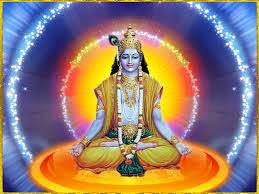 Sri Ganapathy Sachchidananda Swami has made a history by inspiring, encouraging, guiding and blessing 43 children of ages 6 thru 14 to memorize all 700 verses of Bhagavad Gita and chant in His presence. On July 17, 2016 these children chanted Bhagavad Gita without looking at the book sitting for more than four hours creating vibrations and spreading the energy waves across the space. These children’s lives have changed forever as these verses have permeated their body, mind and soul. It is also time to remember that Lord resides in each of these verses thereby that Lord Krishna will be there with them and in them. By memorizing, they have absorbed the eternal message, improved their intelligence and expanded their memory bank. The power of the Sanskrit and vibrations created by chanting the mantras (verses), would live with them forever. Bhagavad Gita will help them to face numerous roadblocks with little difficulty. The eternal universal message will guide them throughout their lives. Bhagavad Gita will equip them with a lifelong friend who travels with them wherever they go. It never fails them. Many scholars, researchers, philosophers, politicians reaped the benefit in their daily pursuits as well as their academic pursuits. By commanding the children to learn Bhagavad Gita, Sri Swamiji instilled curiosity in them, helped them to memorize all 700 verses of Bhagavad Gita, implanted courage in them, infused confidence, helped expand their memory power, and shaped their personalities for life. With Sri Swamiji’s blessings, these kids will be the role models for the other children and their parents to pursue their innate talent and become ambassadors to the richness of Sanatana dharma. Finally, the Lord says, He is dearest to me who imparts this knowledge to earnest spiritual students. Study of the Gita is a great yajna or sacrifice because the student offers his ignorance to be burnt up in the fire of knowledge. Even those who listen to the Gita with faith in the Lord reach the land of the meritorious, the world of peace and joy, for the reaction of their past misdeeds will not act upon them. Sri Krishna’s instruction to Arjuna is over now. Sanjay narrated to blind Dhritarashtra the message of Lord Krishna to Arjun. Sanjay realised that if we follow the message of Lord Krishna, we will be happy, successful and victorious. This message fell in the deaf ears of blind king with no effect on Dhritarashtra. Sanjaya expresses his thrill at what he has heard: “This is the dialogue I heard between Krishna and Arjuna, and the wonder of it makes my hair stand on end! Through divine grace of Vyasa, I have heard the supreme secret of spiritual union directly from the Lord of Yoga himself. Whenever I remember these wonderful, holy words, I am filled with joy. Wherever Krishna and Arjuna are together, there will be prosperity, happiness, and victory; of this I have no doubt. (18:74–76, 78) NOTE: Part I of the article was published in Savetemples.org. It can be accessed by clicking on the link: https://www.savetemples.org/2017/12/05/eternal-universal-message-of-bhagavad-gita-part-1/)
Sri Ganapathy Sachchidananda Swami has made a history by inspiring, encouraging, guiding and blessing 43 children of ages 6 thru 14 to memorize all 700 verses of Bhagavad Gita and chant in His presence. On July 17, 2016 these children chanted Bhagavad Gita without looking at the book sitting for more than four hours creating vibrations and spreading the energy waves across the space. These children’s lives have changed forever as these verses have permeated their body, mind and soul. It is also time to remember that Lord resides in each of these verses thereby that Lord Krishna will be there with them and in them. By memorizing, they have absorbed the eternal message, improved their intelligence and expanded their memory bank. The power of the Sanskrit and vibrations created by chanting the mantras (verses), would live with them forever. Bhagavad Gita will help them to face numerous roadblocks with little difficulty. The eternal universal message will guide them throughout their lives. Bhagavad Gita will equip them with a lifelong friend who travels with them wherever they go. It never fails them. Many scholars, researchers, philosophers, politicians reaped the benefit in their daily pursuits as well as their academic pursuits. By commanding the children to learn Bhagavad Gita, Sri Swamiji instilled curiosity in them, helped them to memorize all 700 verses of Bhagavad Gita, implanted courage in them, infused confidence, helped expand their memory power, and shaped their personalities for life. With Sri Swamiji’s blessings, these kids will be the role models for the other children and their parents to pursue their innate talent and become ambassadors to the richness of Sanatana dharma. Finally, the Lord says, He is dearest to me who imparts this knowledge to earnest spiritual students. Study of the Gita is a great yajna or sacrifice because the student offers his ignorance to be burnt up in the fire of knowledge. Even those who listen to the Gita with faith in the Lord reach the land of the meritorious, the world of peace and joy, for the reaction of their past misdeeds will not act upon them. Sri Krishna’s instruction to Arjuna is over now. Sanjay narrated to blind Dhritarashtra the message of Lord Krishna to Arjun. Sanjay realised that if we follow the message of Lord Krishna, we will be happy, successful and victorious. This message fell in the deaf ears of blind king with no effect on Dhritarashtra. Sanjaya expresses his thrill at what he has heard: “This is the dialogue I heard between Krishna and Arjuna, and the wonder of it makes my hair stand on end! Through divine grace of Vyasa, I have heard the supreme secret of spiritual union directly from the Lord of Yoga himself. Whenever I remember these wonderful, holy words, I am filled with joy. Wherever Krishna and Arjuna are together, there will be prosperity, happiness, and victory; of this I have no doubt. (18:74–76, 78) NOTE: Part I of the article was published in Savetemples.org. It can be accessed by clicking on the link: https://www.savetemples.org/2017/12/05/eternal-universal-message-of-bhagavad-gita-part-1/) DONATIONS
Please DONATE. Your donations are appreciated to continue the work.
NOTE: GHHF is exempt from federal income tax under section 501 (c) 3 of the Internal Revenue code.
Our tax ID # 41-2258630
Donate at: https://www.savetemples.org (click ‘Donate’ button on right side).
Where to send your DONATIONS?
Global Hindu Heritage Foundation
14726 Harmony Lane, Frisco, TX 75035.
Your donations are tax deductible. Our Tax ID: # 41-2258630
Any questions, call: Prakasarao Velagapudi
Please subscribe to Save Temples Telegram channel at https://t.me/savetemples



















